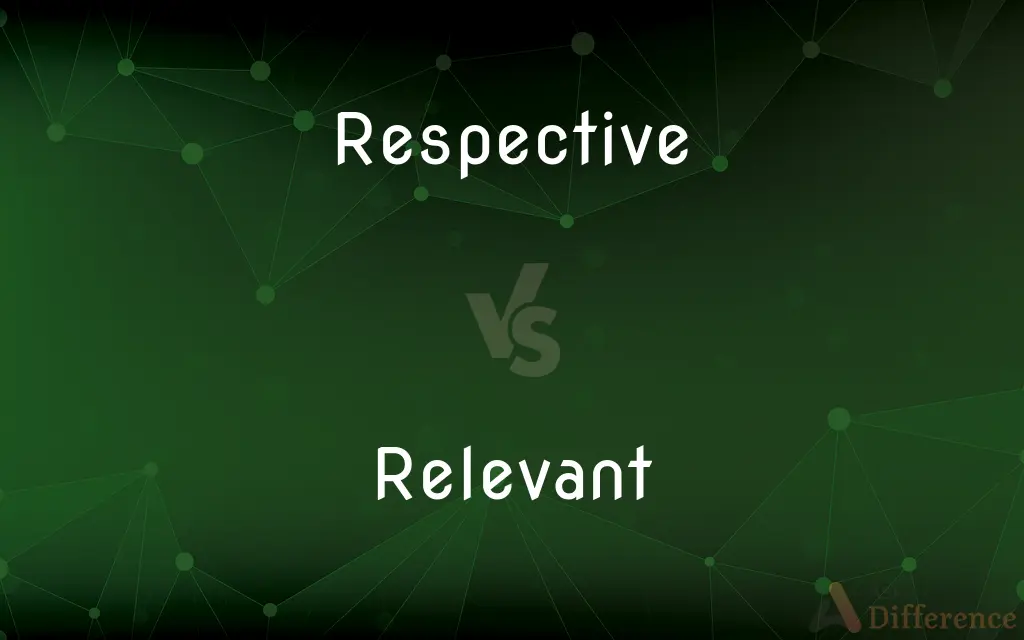Respective vs. Relevant — What's the Difference?
By Maham Liaqat & Urooj Arif — Updated on March 19, 2024
"Respective" relates to two or more items considered individually, often in relation to a list or sequence, while "relevant" pertains to the importance or significance of something in a given context.

Difference Between Respective and Relevant
Table of Contents
ADVERTISEMENT
Key Differences
"Respective" is used to indicate that something belongs or relates to each of the items mentioned, individually. It's often employed to clarify that each item in a list or sequence has its own corresponding element or characteristic. For example, when discussing the roles of multiple people in a project, "respective" helps specify that each person has a distinct role. On the other hand, "relevant" refers to how pertinent, applicable, or important something is within a certain context or discussion. It's used to denote the significance of information, facts, or details that directly influence or relate to the matter at hand.
While "respective" ensures clarity in attributing specific details or roles to each item or person in a sequence, "relevant" is concerned with the value or applicability of information or elements within a specific context. The use of "respective" helps avoid confusion when multiple entities are involved, ensuring each is considered on its own terms. Conversely, "relevant" is a criterion for evaluating information or elements based on their contribution to understanding or resolving a particular situation or topic.
In communication, "respective" is instrumental in organizing and specifying information, particularly when parallel actions or attributes are involved. It underlines the individualized aspect of items within a collective context. "Relevant," however, is key to focusing discussions, analyses, or considerations, filtering out what is essential from what is extraneous in relation to the topic.
The distinction between "respective" and "relevant" is thus foundational to both clarity and pertinence in discourse. "Respective" addresses the distribution of attributes or actions among a set, while "relevant" assesses the importance or applicability of something to the topic or context. Recognizing when to use each term enhances the precision and effectiveness of communication, whether in academic writing, business communication, or everyday conversation.
Comparison Chart
Definition
Pertaining individually to each of several items
Pertaining to the matter at hand; significant
ADVERTISEMENT
Usage
Organizes information; clarifies individual aspects
Filters information; identifies important aspects
Focus
Individual attributes or items within a group
Importance or applicability to a context
Application
Used when detailing specifics for each item listed
Used when assessing significance or pertinence
Communication
Ensures clarity in attributing details
Focuses discussion or content on pertinent issues
Compare with Definitions
Respective
Indicates individual association within a group.
Participants received certificates in their respective categories.
Relevant
Of significant importance or relevance.
Staying updated with relevant technologies is crucial in this field.
Respective
Used to specify corresponding items in a sequence.
The authors will discuss their respective works at the conference.
Relevant
Aiding in determining what is directly related or significant.
Please keep the discussion relevant to the agenda.
Respective
Ensures clarity by attributing specifics to each item.
The team members completed their respective tasks on time.
Relevant
Pertaining to the subject being considered.
The witness provided relevant testimony to the case.
Respective
Relating individually to each of several people or things.
The players returned to their respective homes after the tournament.
Relevant
Closely connected or appropriate to the topic at hand.
Only relevant information should be included in the report.
Respective
Organizes information by linking elements to particular subjects.
The siblings inherited their respective shares of the estate.
Relevant
Applicable or pertinent in a given context.
The seminar addresses issues relevant to new parents.
Respective
Relating to two or more persons or things regarded individually; particular
Successful in their respective fields.
Relevant
Closely connected or appropriate to what is being done or considered
The candidate's experience is relevant to the job
What small companies need is relevant advice
Respective
Relating to particular persons or things, each to each; particular; own.
They returned to their respective places of abode.
Relevant
Having a bearing on or connection with the matter at hand.
Respective
(obsolete) Noticing with attention; careful; wary.
Relevant
Meaningful or purposeful in current society or culture
Thought that the traditional male role of breadwinner was no longer relevant.
Respective
(obsolete) Looking toward; having reference to; relative, not absolute.
The respective connections of society
Relevant
Related, connected, or pertinent to a topic.
Respective
(obsolete) Fitted to awaken respect.
Relevant
(Usually and especially) Directly related, connected, or pertinent, with important ramifications or implications.
His mother provided some relevant background information concerning his medical condition.
Respective
(obsolete) Rendering respect; respectful; regardful.
Relevant
Not out of date; current.
Respective
Noticing with attention; hence, careful; wary; considerate.
If you look upon the church of England with a respective eye, you can not . . . refuse this charge.
Relevant
Relieving; lending aid or support.
Respective
Looking towardl having reference to; relative, not absolute; as, the respective connections of society.
Relevant
Bearing upon, or properly applying to, the case in hand; pertinent; applicable.
Close and relevant arguments have very little hold on the passions.
Respective
Relating to particular persons or things, each to each; particular; own; as, they returned to their respective places of abode.
Relevant
Sufficient to support the cause.
Respective
Fitted to awaken respect.
Relevant
Having a bearing on or connection with the subject at issue;
The scientist corresponds with colleagues in order to learn about matters relevant to her own research
Respective
Rendering respect; respectful; regardful.
With respective shame, rose, took us by the hands.
With thy equals familiar, yet respective.
Relevant
Having crucial relevance;
Crucial to the case
Relevant testimony
Respective
Considered individually;
The respective club members
Specialists in their several fields
The various reports all agreed
Common Curiosities
What does "respective" mean?
"Respective" refers to something that pertains individually to each of several items or people mentioned.
Can something be both respective and relevant?
Yes, information can be both respective and relevant if it individually pertains to items in a discussion and is significant to the context.
How does relevancy affect the understanding of a topic?
Relevancy filters out extraneous information, focusing attention on what is important for understanding or addressing a topic.
What makes information "relevant"?
Information is "relevant" if it directly relates to, impacts, or is significant for the topic or context being considered.
How do "respective" and "relevant" contribute to effective communication?
"Respective" contributes by ensuring precision in attributing details to specific subjects, while "relevant" helps maintain focus on important aspects of the discussion.
How is "relevant" used?
"Relevant" is used to describe information or elements that are pertinent or significant to the matter being discussed.
When should I use "respective" in a sentence?
Use "respective" when you need to clarify that certain details or attributes specifically belong to or are associated with each item mentioned.
Can the relevance of a fact be subjective?
Yes, the perceived relevance of information can vary among individuals depending on their perspectives, objectives, or the specific context.
Why is it important to use "respective"?
Using "respective" is important for clarity and specificity when referring to individual attributes or roles of items in a group.
How can one improve the relevance of their contributions to a discussion?
By staying informed about the topic, understanding the audience’s interests, and focusing contributions on aspects that directly impact or advance the discussion.
Can "relevance" change over time in a given context?
Yes, what is considered relevant can change as the context or the needs of the discussion evolve.
Is the use of "respective" limited to formal writing?
No, "respective" can be used in both formal and informal contexts to clarify individual associations or specifics.
What role does audience play in determining relevance?
The interests, knowledge level, and needs of the audience greatly influence what is considered relevant in communication.
Are there tools or methods to assess the relevancy of information?
Yes, critical thinking, research skills, and feedback from others are effective methods for assessing the relevancy of information in various contexts.
How do I decide whether information is relevant?
Determine relevancy by assessing whether the information contributes meaningfully to the understanding, discussion, or resolution of the topic at hand.
Share Your Discovery

Previous Comparison
Quantification vs. Quantitation
Next Comparison
Elephant vs. LionAuthor Spotlight
Written by
Maham LiaqatCo-written by
Urooj ArifUrooj is a skilled content writer at Ask Difference, known for her exceptional ability to simplify complex topics into engaging and informative content. With a passion for research and a flair for clear, concise writing, she consistently delivers articles that resonate with our diverse audience.















































